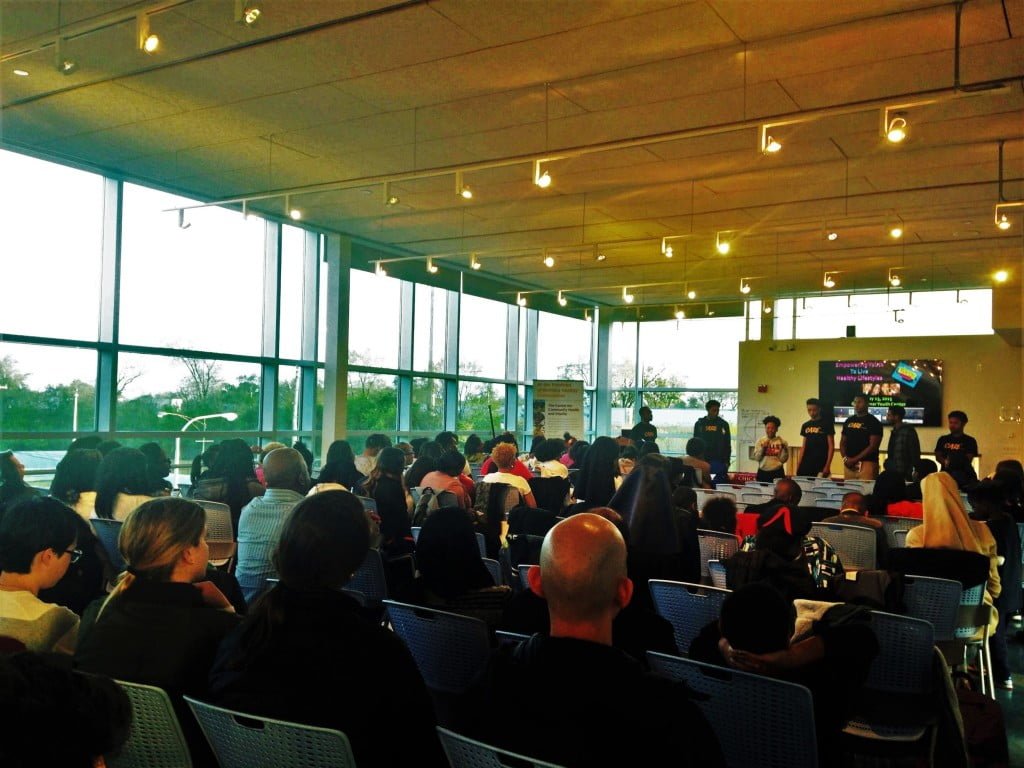
- About 130 attendees fill the Gary Comer Youth Center on May 13 for the University of Chicago Community Grand Rounds. Photo by the ITM.
The University of Chicago’s Community Grand Rounds (CGR) connects South Side residents with UChicago officials and the latest research on the topics that impact their health the most, and in 2015 alone more than 400 people attended dynamic sessions addressing topics like domestic violence, mental health, and obesity prevention.
“It’s important to come out of the ivory towers and into the community, touching people where they live and work,” said Doriane Miller, MD, Associate Professor of Medicine, who leads the CGR program.
Miller and her colleagues at UChicago’s Institute for Translational Medicine (ITM) launched CGR in 2010, and since then it has touched more than 2,500 people. She said the CGR creates a bridge between health care and the community by taking research and translating it into education that can improve people’s lives.
The last CGR event of the 2015 season, “Empowering Youth to Live Healthy Lifestyles,” brought young presenters and about 130 attendees to the Gary Comer Youth Center stage on May 13 to discuss health issues that are important to adolescents.
“This is a wonderful opportunity for youth to feel supported and empowered by their community,” said T-awannda Piper, who works with nonprofit Demoiselle 2 Femme, one of the organizations that presented that evening.
Nearly half of the 20 million new sexually transmitted diseases (STDs) diagnoses each year are in people between the ages of 15 and 24. Demoiselle 2 Femme is a community building program for young girls on the South Side, and its youth leaders discussed STDs with CGR attendees.
Students from independent school Muhammad University of Islam presented on adolescent asthma, which affects about 6.8 million children in the US, and young volunteers with Chicago Youth Programs, a nonprofit that educates and empowers youth from low-income families, quizzed the audience on their knowledge of sugar content in drinks.
The violence prevention youth council B.R.A.V.E. Youth Leaders closed out the event by addressing the prevalence and impact of violence among young people. The CDC’s most recent numbers reveal the significance of the problem — in 2010, nearly 5,000 people between the ages of 10 and 24 were victims of homicide.
“Bringing people into a setting like this and having them teach one another helps to engender trust in the community,” Miller said.
The events reach a variety of community members, ranging from young students to parents to budding doctors.
Jasmine Williams, a Morgan Park resident who attended the event and works with Demoiselle 2 Femme, said CGR helps young residents better understand important health issues.
“When it comes to youth, they’re often given incorrect information,” Williams said. “It’s best for them to learn about health in an event like this or from people in the profession.”
And participants from UChicao said that they benefit as well.
“It’s a way to better understand what’s going on in the community and will ultimately help us as physicians,” said Chester Kao, a UChicago Pritzker School of Medicine student who attended as part of a public health class.
These CGR events also keep community residents of all ages in the loop about how to stay healthy, said Senyah Haynes, the special events and volunteer coordinator at the Gary Comer Youth Center.
“The information they learn empowers them to tackle thorny health issues and be ambassadors in their own communities and their own peer groups,” Haynes said.
Community Grand Rounds (CGR) holds at least four events each year between September and June. Get involved by contacting Doriane Miller, MD, at Doriane.Miller@uchospitals.edu.



